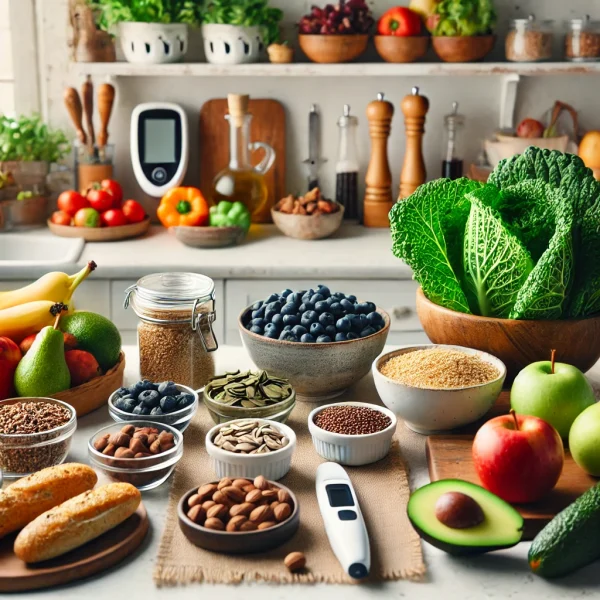Food for Diabetics
Top Foods for Diabetics: A Comprehensive Guide to Managing Blood Sugar

Introduction
Are you or a loved one dealing with diabetes in your daily life? Managing diabetes is crucial for maintaining your overall health and well-being. At Apollo Sugar Clinics, we specialize in providing comprehensive care and effective treatments for diabetes, and a vital part of that care involves making the right dietary choices. Whether you’ve been recently diagnosed or are looking for new ways to manage your condition, understanding the best foods for diabetics can empower you to lead a healthier and more balanced life.

Understanding Diabetes and Diet
What Is Diabetes?
Diabetes is a chronic condition that affects how your body processes blood sugar (glucose). It occurs when the pancreas does not produce enough insulin or the body cannot effectively use the insulin it produces. This leads to elevated blood glucose levels, which, if left unmanaged, can lead to serious health complications. There are two main types of diabetes—Type 1 and Type 2—each requiring careful management of blood sugar levels.
Why Diet Matters for Diabetes
For individuals living with diabetes, diet plays an essential role in controlling blood sugar levels. Consuming the right foods can help prevent blood sugar spikes, improve insulin sensitivity, and manage weight—all key factors in managing diabetes. The right diet also contributes to overall heart health and reduces the risk of other complications like high blood pressure and high cholesterol.
Best Foods for Diabetics
High-Fiber Foods
- Whole Grains: Oats, quinoa, brown rice, and whole wheat are excellent sources of fiber, which slows digestion and helps stabilize blood sugar.
- Leafy Greens: Vegetables like spinach, kale, and collard greens are low in carbohydrates and high in vitamins and minerals, making them ideal for a diabetes-friendly diet.
- Legumes: Beans, lentils, and chickpeas provide plant-based protein and are packed with fiber, helping to regulate blood sugar.
Lean Protein
- Fish: Fatty fish such as salmon, mackerel, and sardines are rich in omega-3 fatty acids, which support heart health and reduce inflammation.
- Poultry: Skinless chicken and turkey are lean sources of protein that do not significantly raise blood sugar.
- Plant-Based Proteins: Tofu, tempeh, and seitan offer high-quality protein while being low in unhealthy fats.
Healthy Fats
- Avocados: Rich in heart-healthy monounsaturated fats, avocados can help improve cholesterol levels and support blood sugar regulation.
- Nuts and Seeds: Almonds, walnuts, chia seeds, and flaxseeds provide healthy fats, protein, and fiber, making them great snacks for stabilizing blood sugar.
- Olive Oil: A staple in the Mediterranean diet, olive oil offers anti-inflammatory properties and can be used for cooking or as a salad dressing.
Low-Glycemic Fruits
- Berries: Blueberries, strawberries, and raspberries are rich in antioxidants and low in sugar, making them perfect for satisfying sweet cravings without causing spikes in blood sugar.
- Apples: A medium-sized apple with the skin contains fiber and vitamin C, making it a nutritious, low-glycemic fruit choice.
- Citrus Fruits: Oranges, lemons, and grapefruits offer vitamin C and fiber while being lower in carbohydrates than other fruits.
Foods to Avoid for Diabetics
Managing diabetes also means avoiding certain foods that can cause rapid increases in blood sugar levels:
- Sugary Drinks: Sodas, fruit juices, and sweetened teas contain large amounts of added sugars, leading to blood sugar spikes.
- Refined Carbs: White bread, pastries, and sugary cereals can cause quick spikes in glucose levels, as they are processed and stripped of nutrients.
- Fried and Processed Foods: High in unhealthy fats, fried foods and highly processed snacks can lead to weight gain and insulin resistance.
Long-Term Dietary Management for Diabetes
Portion Control
Eating balanced portions is essential for blood sugar control. Try using smaller plates, measuring portions, and being mindful of carb intake to prevent overeating and glucose spikes.
Meal Planning
Planning meals ahead of time helps ensure that you’re consistently eating healthy, balanced meals that support your diabetes management. Include a variety of whole grains, vegetables, lean proteins, and healthy fats in your weekly plan.
Monitoring Blood Sugar
Regularly checking your blood sugar before and after meals helps you understand how different foods impact your glucose levels, allowing you to make informed dietary choices.
Our Approach to Diabetes Management at Apollo Sugar Clinics
Comprehensive Nutritional Counseling
At Apollo Sugar Clinics, we understand that each person’s nutritional needs are different. That’s why we offer personalized dietary plans tailored to your unique needs, lifestyle, and medical history. Our expert dietitians work with you to develop a sustainable eating plan that helps you manage your diabetes effectively.
Ongoing Support and Monitoring
Managing diabetes requires ongoing support. We offer regular consultations to track your progress, adjust your meal plans as needed, and provide guidance on managing your condition through a balanced diet and lifestyle.
Why Choose Apollo Sugar Clinics?
- Expert Nutritional Advice: Our team of dietitians specializes in diabetes care and will guide you in making the best dietary choices for managing your blood sugar levels.
- Customized Plans: We provide personalized meal plans that align with your health goals and preferences, ensuring a sustainable approach to diabetes management.
- Holistic Care: In addition to dietary management, we offer comprehensive services for diabetes care, including medication, exercise guidance, and lifestyle coaching.

BOOK YOUR APPOINTMENT TODAY!
If you or a loved one is living with diabetes, schedule a consultation with us at Apollo Sugar Clinics. Our team of experts is here to support your journey to better health through effective diet management and personalized care.
F.A.Q

Foods high in fiber, lean proteins, and healthy fats are great for managing diabetes. These include whole grains, leafy greens, fatty fish, legumes, and nuts. Avoid refined carbs and sugary drinks to maintain stable blood sugar levels.
Yes, you can eat fruit, but choose low-glycemic fruits like berries, apples, and citrus fruits. These options have less impact on blood sugar than high-sugar fruits like mangoes and bananas.
The amount varies based on individual needs, but a general guideline is to aim for 45-60 grams of carbs per meal. Consult a dietitian to personalize your carb intake.
Avoid sugary beverages, refined carbohydrates (like white bread and pastries), and fried or processed foods, as these can cause rapid blood sugar spikes.
Yes, following a balanced, diabetes-friendly diet that includes high-fiber foods, lean proteins, and healthy fats can aid in weight management and improve insulin sensitivity.
Yes, low-fat dairy options like skim milk, yogurt, and cheese are good sources of protein and calcium. Choose unsweetened or low-sugar varieties to avoid blood sugar spikes.
